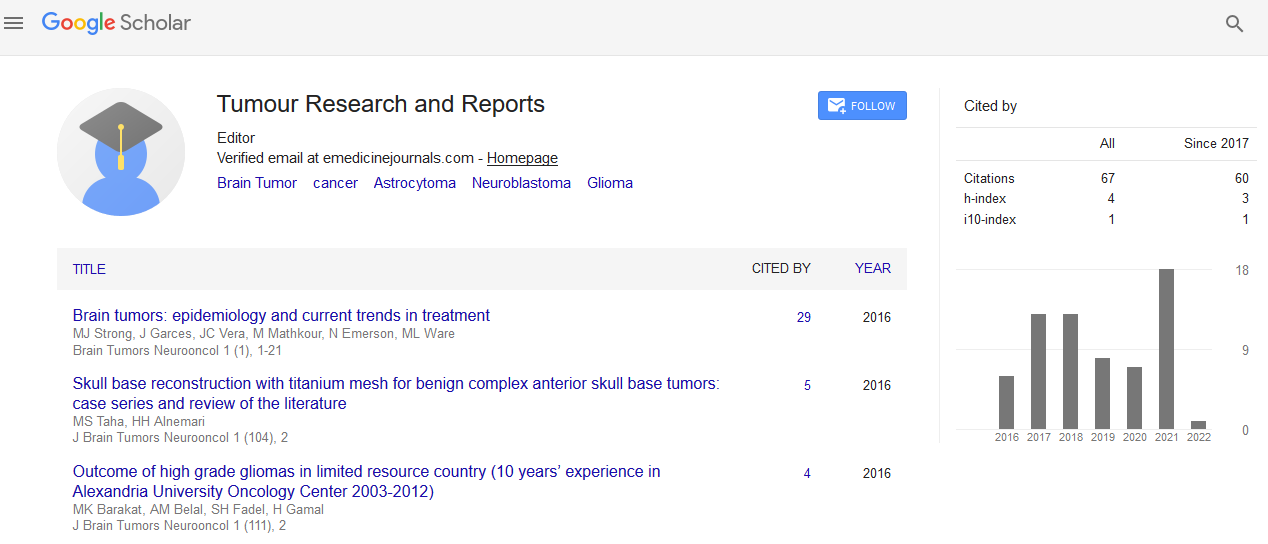Indexed In
- RefSeek
- Hamdard University
- EBSCO A-Z
- Google Scholar
Useful Links
Share This Page
Journal Flyer

Open Access Journals
- Agri and Aquaculture
- Biochemistry
- Bioinformatics & Systems Biology
- Business & Management
- Chemistry
- Clinical Sciences
- Engineering
- Food & Nutrition
- General Science
- Genetics & Molecular Biology
- Immunology & Microbiology
- Medical Sciences
- Neuroscience & Psychology
- Nursing & Health Care
- Pharmaceutical Sciences
Commentary - (2023) Volume 8, Issue 4
Innovations in DNA-Based Screening Techniques for Colon Carcinoma Detection
Anthony Kanbar*Received: 14-Nov-2023, Manuscript No. JTRR-23-24231; Editor assigned: 17-Nov-2023, Pre QC No. JTRR-23-24231 (PQ); Reviewed: 01-Dec-2023, QC No. JTRR-23-24231; Revised: 08-Dec-2023, Manuscript No. JTRR-23-24231 (R); Published: 15-Dec-2023, DOI: 10.35248/2684-1614.23.8:210
Description
Colon carcinoma, a form of colorectal cancer, stands as a leading cause of cancer-related morbidity and mortality worldwide. The importance of early detection cannot be overstated, and recent years have witnessed significant advancements in screening techniques for colon carcinoma.
Fecal Immunochemical Test (FIT)
One of the fundamental of non-invasive screening, FIT has seen notable improvements. The test detects microscopic amounts of blood in the stool, often indicative of colorectal abnormalities. Recent developments focus on enhancing the sensitivity and specificity of FIT, making it a more reliable tool for early detection.
DNA-based stool tests
The advent of genetic research facilitates for DNA-based stool tests, a potential approach for precise screening. These tests analyze specific genetic markers associated with colon carcinoma, provides a targeted approach. High-throughput sequencing technologies have significantly enhanced the accuracy of these tests, connects us to the personalized screening strategies.
Multitarget stool DNA test
Building on DNA-based stool tests, the multitarget stool DNA test represents a comprehensive approach. By combining multiple markers, including altered DNA and fecal hemoglobin, this test provides a more interesting analysis. Recent studies highlight its efficacy in detecting colorectal neoplasms, underlining its potential as a robust screening tool.
Virtual colonoscopy (CT colonography)
Virtual colonoscopy has evolved as a less invasive alternative to traditional colonoscopy. Recent advancements in imaging technology, including high-resolution scans and threedimensional reconstructions, have significantly improved its accuracy. Virtual colonoscopy is proving to be a valuable screening tool, particularly for individuals opposed to invasive procedures.
Blood-based biomarker tests
Liquid biopsy techniques have gained prominence in cancer research, and colon carcinoma is no exception. Blood-based biomarker tests, focusing on components like circulating tumor DNA (ctDNA), offer a minimally invasive approach to screening. These tests exhibit potential in detecting early-stage cancers and monitoring treatment responses.
Artificial Intelligence (AI) in imaging
The integration of AI into medical imaging has marked a paradigm shift in colon carcinoma screening. Machine learning algorithms analyze colonoscopy images, identifying and highlighting suspicious lesions with remarkable accuracy. AI not only enhances diagnostic precision but also organizes the screening process, making it more efficient.
Improved colonoscopy technologies
Traditional colonoscopy remains as a standard, and recent innovations have refined the procedure. High-definition imaging and advanced endoscopic tools have improved visualization and lesion detection during colonoscopies. These improvements contribute to more accurate screenings and early identification of precancerous lesions.
Serum biomarker tests
Research has identified specific serum biomarkers associated with colon carcinoma. Blood tests measuring the levels of these biomarkers offer a less invasive screening option. Ongoing developments focus on refining the sensitivity and specificity of these tests, aiming to make them valuable additions to the screening toolkit.
The advancements in screening techniques for colon carcinoma precursor in the early detection of this prevalent cancer. From non-invasive tests to refined traditional procedures, these innovations provide a spectrum of options for both clinicians and patients. As research and technology continue to progress, the potential of even more precise, individualized, and accessible screening methods becomes increasingly evident. The ongoing evolution of colon carcinoma screening techniques has a potential to transform outcomes for individuals at risk, emphasizing the collective commitment to reducing the burden of this formidable disease.
Citation: Kanbar A (2023) Innovations in DNA-Based Screening techniques for Colon Carcinoma Detection. J Tum Res Reports. 8:210.
Copyright: © 2023 Kanbar A. This is an open access article distributed under the terms of the Creative Commons Attribution License, which permits unrestricted use, distribution, and reproduction in any medium, provided the original author and source are credited.

